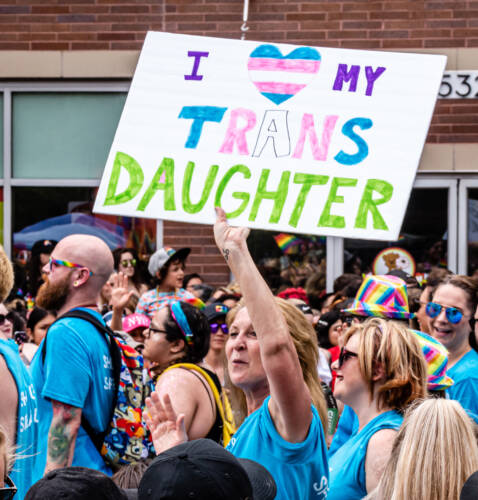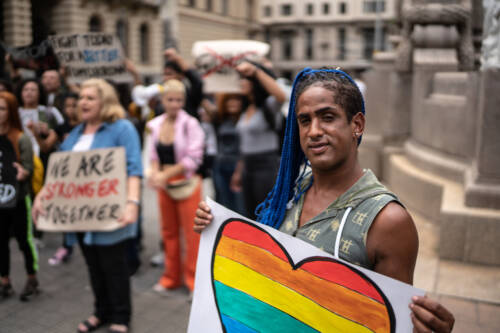This piece is part of an ongoing series focused on the themes of “healing” and “repair.” Follow the blog or check our Facebook page to see the other posts in the series as they’re published bimonthly.
Do we heal? Or is it a matter of moving pain around to find a place where it rests a bit easier? Or perhaps a space is carved out — not ease, but intensity. The heart becomes an ocean, holding the strange creatures dwelling at the sea bottom, the fierce storms that tear everything apart, the light on waves — piercingly beautiful.
In the religious and legal attacks on our trans siblings, we are experiencing a communal wounding — an indulgence in hatred and contempt whose multiple forms no one can evade. We casually deprive young people of medical care that is necessary for their psychological welfare. We strip libraries of books that might give someone a shard of hope that they are not alone. We preach about the “sinfulness” of a trans identity. In all of this, tender bearers of the divine image are mutilated in spirit or depart from a world that seems to offer only derision and isolation.

Lakeview, Chicago-June 30, 2019: A mother carries a sign that reads “I my trans daughter” while marching in the Gay Pride parade. iStock photo.
“In all of this, tender bearers of the divine image are mutilated in spirit or depart from a world that seems to offer only derision and isolation.”
But we are one body. What wounds one wounds all. As racism dehumanizes each of us, if in different ways, transphobia eats away at the spirit. We are bound together — a common humanity, the body of the Beloved. We share the anguish of mothers and neighbors who adore their trans children. If we are lucky, we also encounter the astonishing wonder that God has created. These lives deserve to live. But we deserve to recognize the special loveliness of trans lives. I can’t imagine how impoverished my life would be without my trans loved ones. For me, it is easy to see why some cultures have been wise enough to count their nonbinary members as precious gifts. The divine creativity weaves special magic into these lives.
In order to tend to the wounds inflicted by contempt, hatred and destructive theology, we must remember that our trans friends are icons of the divine. Our tradition has long recognized the “unworthy” ones as uniquely potent messengers of the divine. They are not only reluctantly tolerated — they are special gifts to God’s people. The youngest son is called back from the sheep to become king. Ruth, a despised foreigner, is his great-grandmother. Those debased by nakedness, hunger, prison and illness turn out to be the Beloved: “You did it to me” (Matthew 25:40).

iStock photo.
“But we are one body. What wounds one wounds all.”
The healing that the gospel provides us is a new optic — a capacity to recognize the beauty and belovedness of those whom society, church or family have rejected. It is a healing that inflames the wound — our hearts become capacious, oceanic. We lament the suffering of those tormented by hatred and feel more vividly the destructive power of contempt. But looking more deeply, we see something unbearably beautiful. We see the Beloved present in our trans loved ones. Our Beloved is here among us in all of the messiness and multiplicity of life. Awakening to this divine nearness in our dear-worthy trans friends, we do not “go to heaven” as a reward. We realize we are already there.
Read more here by theologians on transgender identity and inclusion in the Christian tradition in recognition of the coinciding of Easter and on International Transgender Day Visibility
March 31, 2024.

Wendy Farley is the Rice Family Chair of Spirituality at San Francisco Theological Seminary
Wendy Farley retired from Emory University, where she was Chair of Theological Studies, and is now Rice Family Chair of Spirituality at San Francisco Theological Seminary. The author of six books and a retreat leader, her current interests include contemplative practice as an ally in social justice work and in conversation with comparative, feminist and queer theology.
Her books published by Westminster John Knox include “Beguiled by Beauty: Cultivating a Life of Contemplation and Compassion”, “The Thirst of God: Contemplating God’s Love with Three Women Mystics,” “Gathering Those Driven Away: A Theology of Incarnation,” “The Wounding and Healing of Desire: Weaving Heaven and Earth”, “Tragic Vision and Divine Compassion: A Contemporary Theodicy.” Farley has contributed to several other collections of theological essays.
.